Be it an international runway or an Indian ramp, fashion designers often showcase creations that baffle the mind. With fashion taking extreme steps, Meher Castelino asks designers and retailers about the saleability of such garments
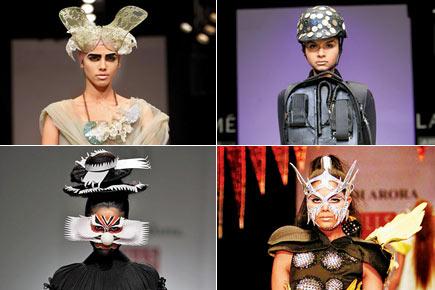
After watching a model strut on the runway wearing an outfit that can only be termed bizarre by the common man, the one question that’s bound to arise is — Who wears this stuff? Do these garments really sell or are they created just to garner eyeballs?
ADVERTISEMENT
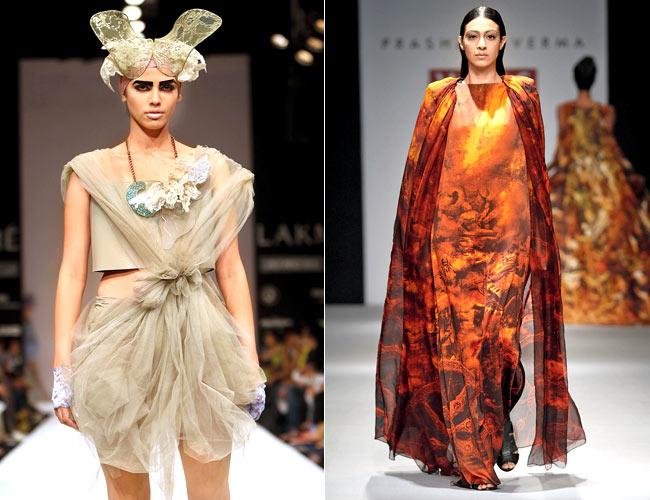 Futuristic silhouettes are part of designer Prashant Varma’s creations while (right) Little Shilpa believes her creations are inspired from her surreal self
Futuristic silhouettes are part of designer Prashant Varma’s creations while (right) Little Shilpa believes her creations are inspired from her surreal self
The fashion eccentrics
International fashion has its eccentric designers such as the late Alexander McQueen, whose Spring/Summer 1995 collection was called The Birds, showcased models with real dead birds on their heads. The Victoria and Albert Museum is paying a tribute to McQueen, known for his exaggerated creations, with an expo called Savage Beauty to be held from March to July 2015.
British designer John Galliano not only creates excitement on the ramp with his extreme fashion and make-up, but also dresses in an equally bizarre manner to attract attention. English fashion designer Vivienne Westwood, was largely inspired by the punk era and her creations included bondage gear, safety pins, razor blades and even bycycle or lavatory chains on clothing.
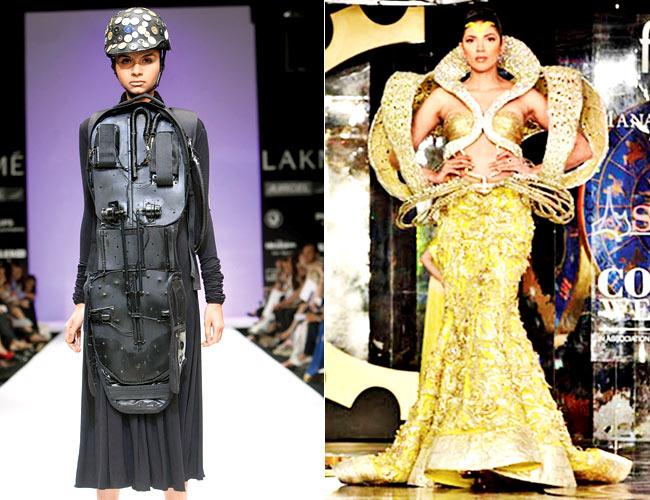
A Vivek Kumar creation which is embedded with an electric circuit. (Right) Manav Gangwani’s gowns are known for their flamboyance
Closer home
The Indian ramps, too, have seen some outlandish creations, which the audience have appreciated. But the question remains, are they wearable?
Maverick designer Manish Arora, who has many firsts to his credit when it comes to showing in the West, left the audience speechless at the Aamby Valley Bridal Week 2010, when he showcased select designs from his collections, ranging from 2008 to 2010, including his Jungle, Circus, Pop Art and other collections. In the Jungle collection, 3D butterflies rose from the garments, while clown pants, voluminous jackets and ruffled skirts were part of the Circus collection.
Arora’s bridal wear shown recently in the capital for India Couture Week was not for the faint-hearted. The unconventional bridal wear had the eccentric Arora touches of shararas resembling bell-bottomed pants, while lehenga/cholis had embellishments that ditched the paisleys and florals, and were more geometric and abstract.
Says the designer, “My clothes are for women who are not afraid to shine and stand out. Some clothes were not our cash cows but managed to communicate the vision behind the collection, which directly improves sales. As a creative person, I don’t want to pigeonhole myself. I believe in artistic freedom and create designs which are true to my vision — whatever it is at that point.” The Delhi-based designer says that he tries to keep his customer base in mind, while also adhering to his artistic instincts.
Prashant Varma and Varun Sardarna, two of the capital’s designers are no longer part of the fashion scene. But when they were, they dazzled the audience with their wildly bizarre creations.
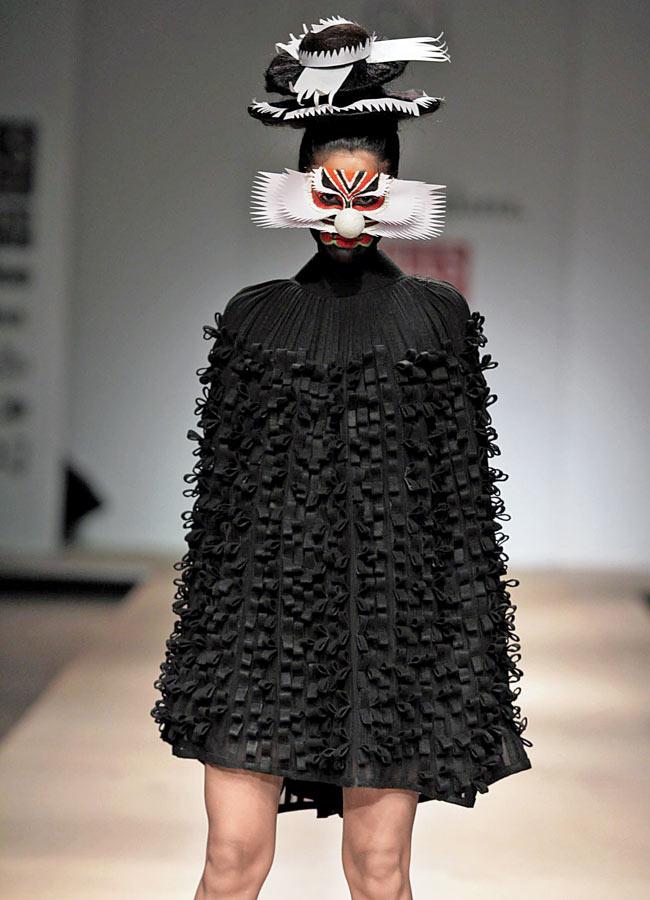
Kathakali-inspired make-up and all-black outfits were featured in Varun Sardarna’s Autumn/Winter 2008 collection
Varma’s Spring/Summer 2011 collection, with images of blood vessels, tumours and skulls on garments as well futuristic silhouettes with savage combative looking shapes, made everyone sit up and take notice.
Sardarna’s Kathakali-inspired makeup for his Autumn/Winter 2008 collection caused a near-stampede as the designer removed all the chairs in the hall and insisted the audience sit on the floor to watch his 12, all-black
garments.
Kolkata-based Vivek Kumar ensures his collections never tread the straight path. His dresses are embedded with electric circuits or embellished with rivets, metal studs and iron tools. Manav Gangwani, known for his extravagant red-carpet creations, has shown gowns that were so elaborate that the models had to stop and pose after taking just a few steps.
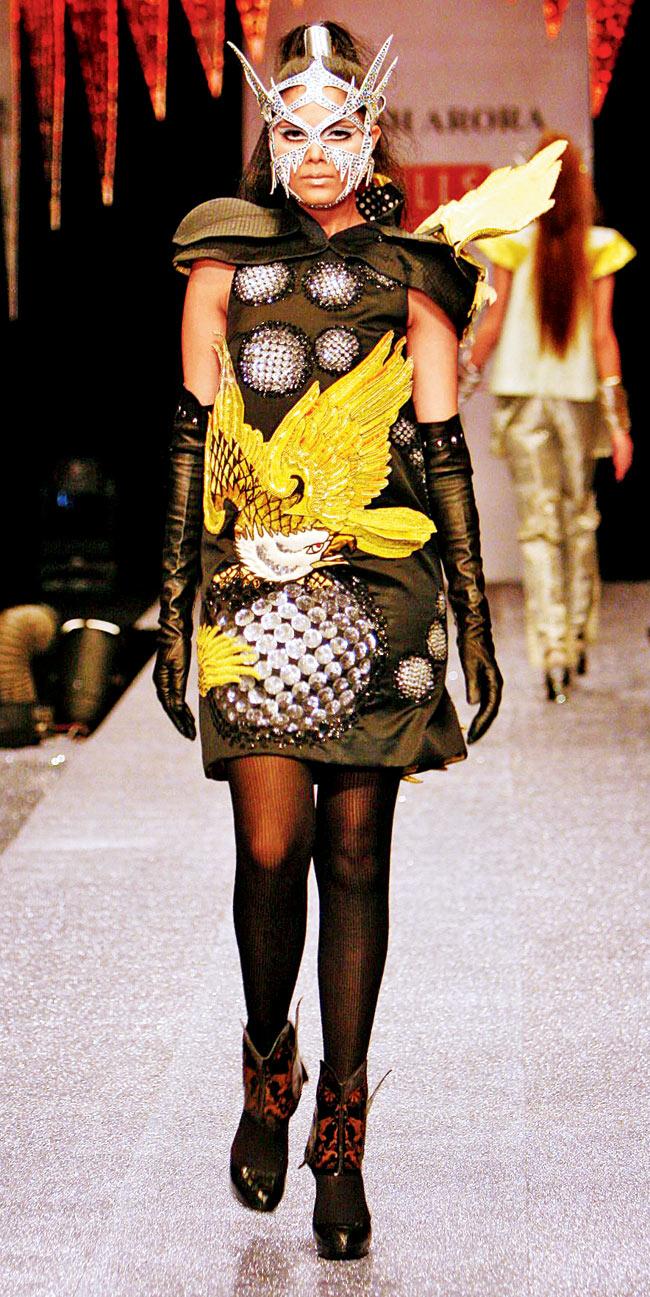
Manish Arora believes in artistic freedom
A surreal world
One of the most extreme creators on the ramp is Shilpa Chavan, popularly known as Little Shilpa because of her petite frame. Having worked with the renowned milliner, Philip Tracey, Shilpa’s design sensibilities evoke gasps of surprise and admiration, but leave many baffled as well. Her inspirations are often esoteric and the presentation has a hidden message, which, at times, is difficult to fathom.
Explaining her design philosophy, Shilpa reveals. “My complete ensembles may occasionally look exaggerated, but they consist of separate pieces that could be worn according to one’s comfort level. Everything shown on the ramp can be scaled down for retail. And everything on the ramp, no matter how grandiose, is for sale. My designs are invitations into the imaginative world. I wouldn’t say it’s the real me, but definitely it’s the surreal me that comes out in my collections. Most importantly, I enjoy what I do, and I make sure my pieces are imbued with a sense of irreverent joy.”
Retail reaction
Anjana Sharma, COO and Fashion Director, Stylista.com, feels, “Fashion weeks are cluttered, so creativity needs to shout to grab eyeballs. I would do installation art with such creations. Creative expression is never a waste of time or money. All it takes is savvy and smart spin doctors to make it work. A balance between creativity and sales
is important.”
In fashion, the bizarre is often reworked and toned down for the ordinary mortals as prêt wear, or may even go into the mass market in a toned down form. So what may look outlandish on the ramp often ends up in a diluted form in one’s wardrobe.
 Subscribe today by clicking the link and stay updated with the latest news!" Click here!
Subscribe today by clicking the link and stay updated with the latest news!" Click here!






